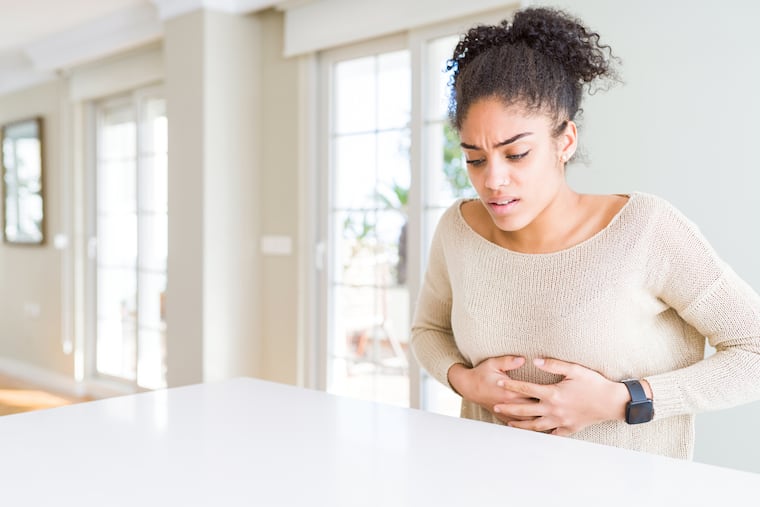Pandemic stress is making teens’ gastrointestinal problems worse | Expert Opinion
Gastrointestinal problems are common in teenagers, and pandemic stress can exacerbate them. Trust your gut instinct. If your child looks seriously ill, go to the ED or call 911.

Did you know that the gut and the brain are connected? They’re like BFFs, “texting” all day long through the gut-brain axis. When the brain gets anxious, the gut feels “upset” too. Even Merriam-Webster recognized the strong bond when adding “hangry” to the dictionary in 2018. The pandemic is like a bully, picking on the BFFs, and making their lives miserable. Gastrointestinal problems are common in teenagers, and pandemic stress is no friend. Here are some gastrointestinal issues that stressed teens may experience:
Constipation is having fewer than two bowel movements in a week, having dry, hard, or difficult-to-pass bowel movements, and feeling that some of the bowel movement hasn’t passed. Constipation can be caused by a diet that doesn’t include enough water and fiber or by certain medications (such as iron), medical conditions such as thyroid problems, and stress. Symptoms include abdominal pain, feeling full or bloated, straining to have a bowel movement, and bleeding due to anal fissures (tears) from straining.
Gastroesophageal reflux (GER) is when food and acid from the stomach go backward into the esophagus. The cause of GER is the lower esophageal sphincter, which separates the esophagus from the stomach, relaxing at the wrong time or not closing as tightly as it should. GER that happens a lot is called gastroesophageal reflux disease (GERD). Symptoms of GER include a burning sensation in the chest (“heartburn”), burping, frequent hiccups, vomiting after meals, bad breath, and frequent dental cavities. Symptoms tend to be worse after meals and when lying down. For some people, stress can make the symptoms worse.
Irritable bowel syndrome (IBS) is a chronic gastrointestinal disorder that affects the large intestine. The exact cause of IBS is not known but is likely a combination of genetics, the immune system, and something in the environment that sets off inflammation (redness and swelling) in the GI tract. Symptoms include diarrhea or constipation (or both), cramping, abdominal pain, bloating, and gas. IBS is a chronic condition that requires long-term management. Infections, certain foods, and drinks, such as milk, chocolate, drinks with caffeine, gassy foods, and fatty foods, as well as stress can trigger IBS symptoms.
Gastritis is inflammation of the lining of the stomach. Gastritis can be caused by chronic vomiting, overuse of some medications (such as ibuprofen), alcohol, smoking, abdominal injuries, some bacterial and viral infections, and stress. Symptoms include abdominal pain, bloating, nausea, hiccups, loss of appetite, dark stools, vomiting blood, or hunger pangs at night or between meals.
Ulcers are painful open sores in the stomach and the small intestine. Chronic gastritis, bacterial infections (namely H. pylori), certain medications, and smoking can cause ulcers. Symptoms can include weight loss, sudden sharp abdominal pain, vomiting, bloody stools, and dark stools.
Inflammatory bowel disease (IBD) is the term for two conditions (Crohn’s disease and ulcerative colitis) that cause chronic inflammation of the GI tract. Many factors including genetics and the immune system contribute to IBD. Crohn’s disease can affect any part of the GI tract from the mouth to the anus. Ulcerative colitis happens only in the large intestine. The most common symptoms of IBD are abdominal pain and diarrhea, but it can also cause constipation, rectal bleeding, anal fissures, and weight loss. Other problems seen with IBD are rashes, eye problems, joint pain and arthritis, and liver problems. Stress can make symptoms worse.
When should parents take their teenager to the emergency department (ED)? Although many of the above conditions can be treated at home with the help of your primary care provider (PCP), more severe symptoms may warrant taking your teenager to the ED. Your PCP can help you decide whether it is necessary to go to the ED. Reasons to go to the ED include:
Severe abdominal pain may signal a surgical emergency.
Pain in the right-lower quadrant of the abdomen may be a surgical emergency such as appendicitis or ovarian torsion
Abdominal pain with high fevers may be a serious infection.
Inability to eat or drink anything for more than 24 hours may cause dehydration.
Recurrent episodes of blood in vomit or bowel movements may signal active bleeding in the GI tract.
Trust your gut instinct. If your child looks seriously ill, go to the ED or call 911. For more information about coping with stress, visit kidshealth.org/en/parents/stress.html.
Rima Himelstein is an adolescent medicine physician and Sydney Kuzoian is a third-year pediatric resident at Nemours Children’s Hospital, Delaware.